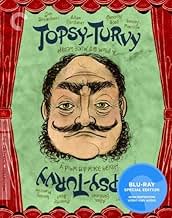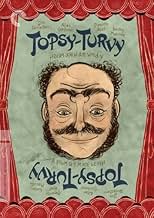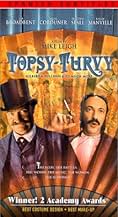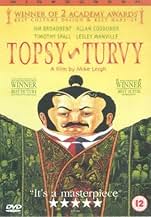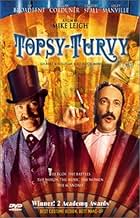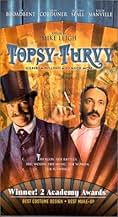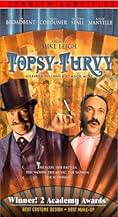Topsy-Turvy
- 1999
- Tous publics
- 2h 40m
IMDb RATING
7.3/10
14K
YOUR RATING
Set in the 1880s, chronicles how during a creative dry spell, the partnership of the legendary musical/theatrical writers Gilbert and Sullivan almost dissolves, before they turn it all aroun... Read allSet in the 1880s, chronicles how during a creative dry spell, the partnership of the legendary musical/theatrical writers Gilbert and Sullivan almost dissolves, before they turn it all around and write the Mikado.Set in the 1880s, chronicles how during a creative dry spell, the partnership of the legendary musical/theatrical writers Gilbert and Sullivan almost dissolves, before they turn it all around and write the Mikado.
- Won 2 Oscars
- 13 wins & 28 nominations total
Bill Neenan
- Cook
- (as William Neenan)
- Director
- Writer
- All cast & crew
- Production, box office & more at IMDbPro
Featured reviews
Gilbert and Sullivan are a successful musical team writing their shows for the Savoy Hotel in London. However Sullivan is tired and is suffering from ill-health. During a bad bout he resolves to no longer write for the Savoy with Gilbert but instead to recover in France and then to strike out alone and write a grand opera. Gilbert meanwhile, is showing signs of fatigue coming up with plots that use the same devices to the same ends. However the two are contractually obliged to continue their relationship, a prospect both seem ill at ease with until Gilbert takes an afternoon off at an exhibition of Japanese culture, sowing the seeds of inspiration for The Mikado.
I honestly had never even heard of this film until the television premier in 2002, if you had told me Mike Leigh had made a film on such subject matter I would likely have laughed down my sleeve at such a suggestion. However I gave this a watch despite the fact I know little (or care little) for the works of Gilbert and Sullivan and worries bout the fact it was 160 odd minutes long! However the plot is sufficiently well delivered to take those who only know a little about the pair to keep up. By taking the snapshot of the Mikado to show their relationship the film takes away what could have been a rough, sprawling epic the snapshot works much better. The weaving of the production into the narrative, rather than all at the end, means that both sets of fans will be happy there is enough music to please those who came for that, but also enough plot within to drive the film.
Leigh does very well, mixing humour and telling drama with the music of the show. The production of the film (and the production!) are both very good and the detail is fine. The cast are all excellent. Broadbent is good as the straight-laced Gilbert and his chemistry with the enjoyable Corduner works throughout. The support cast are all good in singing and non-singing scenes I was surprised to see Spall carrying the tunes so well!
Overall this is a good film but I doubt that Gilbert & Sullivan will be much of a draw even now that it is on TV. However if you have the chance to watch it then you should push through your reservations and give it a try it is engaging and humourous enough to overcome a lack of knowledge (or interest) in the pair's work.
I honestly had never even heard of this film until the television premier in 2002, if you had told me Mike Leigh had made a film on such subject matter I would likely have laughed down my sleeve at such a suggestion. However I gave this a watch despite the fact I know little (or care little) for the works of Gilbert and Sullivan and worries bout the fact it was 160 odd minutes long! However the plot is sufficiently well delivered to take those who only know a little about the pair to keep up. By taking the snapshot of the Mikado to show their relationship the film takes away what could have been a rough, sprawling epic the snapshot works much better. The weaving of the production into the narrative, rather than all at the end, means that both sets of fans will be happy there is enough music to please those who came for that, but also enough plot within to drive the film.
Leigh does very well, mixing humour and telling drama with the music of the show. The production of the film (and the production!) are both very good and the detail is fine. The cast are all excellent. Broadbent is good as the straight-laced Gilbert and his chemistry with the enjoyable Corduner works throughout. The support cast are all good in singing and non-singing scenes I was surprised to see Spall carrying the tunes so well!
Overall this is a good film but I doubt that Gilbert & Sullivan will be much of a draw even now that it is on TV. However if you have the chance to watch it then you should push through your reservations and give it a try it is engaging and humourous enough to overcome a lack of knowledge (or interest) in the pair's work.
George Martin once talked about he and John Lennon once having a drink in a British pub. One of the regulars went over to the jukebox and selected "Yesterday." Lennon sighed, turned to Martin and said, "Don't suppose anyone's going to put in 'I am the Walrus?'" Martin went on to suggest that as frustrated as Lennon was of Paul McCartney's "Granny Music," he also couldn't deny McCartney's talent and the ease with which he came up with unforgettable melodies.
One senses the same kind of rivalry between Arthur Sullivan and William Gilbert in Mike Leigh's "Topsy-Turvy." Gilbert and Sullivan were both famous for their hilarious musical comedies in the mid to late 1880s, especially their early hits "H.M.S. Pinafore" and "The Pirates of Penzance." But the film takes place later in their career and things are not boding well for the duo. Sullivan (Alan Corduner) is growing increasingly frustrated with his collaborations with Gilbert, because he feels he is not growing as a composer. "I'm growing tired of these soufflés with Gilbert and his topsy-turvvydom."
Gilbert (Jim Broadbent) is feeling the crunch himself. His latest production with Sullivan has resulted in questions concerning Gilbert's creative spark, as in whether he has one. If that isn't enough, the Savoy Theatre tells the frustrated Sullivan that he and Gilbert are contractually obligated to one more show. Gilbert presents Sullivan with an idea. Sullivan responds that the idea sounds like a remake of an earlier play.
Then inspiration comes from the most unlikely of places. A Japanese Exhibit is being held in London and Gilbert's wife, Kitty (Lesley Manville) forces him to accompany her. Reluctantly Gilbert goes and, reenergized, he picks up a souvenir Samurai sword. He meets with Sullivan again and tells him his idea: "The Mikado." Thus is born Gilbert and Sullivan's last hit play.
The next half of the film deals with the backstage politics and adventures that go with putting on a production. It is here where "Topsy-Turvy" goes into full gear and really begins to shine. Broadbent and Corduner also shine in their respective roles, as well. And it is here where I really paid attention to Leigh's characterizations. The two never had a very friendly relationship and Sullivan was openly bored with Gilbert's silly plays. I always took it for Gilbert being a really witty and good-humored man, and Sullivan being a snob. But Leigh has Sullivan as a fun-loving hedonist and Gilbert being unpersonable and sarcastic. He uses humor as a weapon. The film forced me to look at the two of them in a new light, and more importantly, I bought it.
But Leigh's real achievement is in presenting his supporting cast as three-dimensional characters. There's Richard Temple (Timothy Spall) who plays the Mikado and suffers near-betrayal at the hands of his mentor, Gilbert. Actresses Jessie Bond (Dorothy Atkinson) and Lenora Braham (Shirley Henderson) personify the reluctant acceptance of wearing a kimono with no corset. Leigh brings the same care to this period drama as he has done for his smaller ensemble pieces.
And care is what "Topsy-Turvy" is all about. As much as Sullivan may frown at Gilbert's wit, he still wants to create the best possible product he can. There's a great scene where Gilbert is explaining "The Mikado" to Sullivan and Sullivan is truly enjoying the story. He's got such a look of glee on his face throughout the scene. Corduner does a great job of contrasting his Sullivan with Broadbent's Gilbert, especially in his scenes with the orchestra as he patiently explains the score with his players.
Broadbent, on the other hand, is an absolute joy as Gilbert. Gilbert may not be a likable character, but he knows what he wants and he is good at what he does. He may be short with everyone and unbending, but he gets results.
Leigh shows a clear love for the theatre here, and the details are amazing all the way from the theatre set to the costumes, nothing is out of place. He also keeps the action moving in the film which totals almost three hours but never feels like it. That's very hard to do.
To be honest, I thought Leigh was jumping on the "Shakespeare in Love" bandwagon, but the films couldn't be more different. "Shakespeare in Love" celebrates love burgeoning creativity. "Topsy-Turvy" deals with the love of creativity itself and shows how people of different temperaments and tastes can still get together and produce greatness.
Topsy-Turvy ****
One senses the same kind of rivalry between Arthur Sullivan and William Gilbert in Mike Leigh's "Topsy-Turvy." Gilbert and Sullivan were both famous for their hilarious musical comedies in the mid to late 1880s, especially their early hits "H.M.S. Pinafore" and "The Pirates of Penzance." But the film takes place later in their career and things are not boding well for the duo. Sullivan (Alan Corduner) is growing increasingly frustrated with his collaborations with Gilbert, because he feels he is not growing as a composer. "I'm growing tired of these soufflés with Gilbert and his topsy-turvvydom."
Gilbert (Jim Broadbent) is feeling the crunch himself. His latest production with Sullivan has resulted in questions concerning Gilbert's creative spark, as in whether he has one. If that isn't enough, the Savoy Theatre tells the frustrated Sullivan that he and Gilbert are contractually obligated to one more show. Gilbert presents Sullivan with an idea. Sullivan responds that the idea sounds like a remake of an earlier play.
Then inspiration comes from the most unlikely of places. A Japanese Exhibit is being held in London and Gilbert's wife, Kitty (Lesley Manville) forces him to accompany her. Reluctantly Gilbert goes and, reenergized, he picks up a souvenir Samurai sword. He meets with Sullivan again and tells him his idea: "The Mikado." Thus is born Gilbert and Sullivan's last hit play.
The next half of the film deals with the backstage politics and adventures that go with putting on a production. It is here where "Topsy-Turvy" goes into full gear and really begins to shine. Broadbent and Corduner also shine in their respective roles, as well. And it is here where I really paid attention to Leigh's characterizations. The two never had a very friendly relationship and Sullivan was openly bored with Gilbert's silly plays. I always took it for Gilbert being a really witty and good-humored man, and Sullivan being a snob. But Leigh has Sullivan as a fun-loving hedonist and Gilbert being unpersonable and sarcastic. He uses humor as a weapon. The film forced me to look at the two of them in a new light, and more importantly, I bought it.
But Leigh's real achievement is in presenting his supporting cast as three-dimensional characters. There's Richard Temple (Timothy Spall) who plays the Mikado and suffers near-betrayal at the hands of his mentor, Gilbert. Actresses Jessie Bond (Dorothy Atkinson) and Lenora Braham (Shirley Henderson) personify the reluctant acceptance of wearing a kimono with no corset. Leigh brings the same care to this period drama as he has done for his smaller ensemble pieces.
And care is what "Topsy-Turvy" is all about. As much as Sullivan may frown at Gilbert's wit, he still wants to create the best possible product he can. There's a great scene where Gilbert is explaining "The Mikado" to Sullivan and Sullivan is truly enjoying the story. He's got such a look of glee on his face throughout the scene. Corduner does a great job of contrasting his Sullivan with Broadbent's Gilbert, especially in his scenes with the orchestra as he patiently explains the score with his players.
Broadbent, on the other hand, is an absolute joy as Gilbert. Gilbert may not be a likable character, but he knows what he wants and he is good at what he does. He may be short with everyone and unbending, but he gets results.
Leigh shows a clear love for the theatre here, and the details are amazing all the way from the theatre set to the costumes, nothing is out of place. He also keeps the action moving in the film which totals almost three hours but never feels like it. That's very hard to do.
To be honest, I thought Leigh was jumping on the "Shakespeare in Love" bandwagon, but the films couldn't be more different. "Shakespeare in Love" celebrates love burgeoning creativity. "Topsy-Turvy" deals with the love of creativity itself and shows how people of different temperaments and tastes can still get together and produce greatness.
Topsy-Turvy ****
10Fab4Fan
TOPSY-TURVY, director Leigh's spectacularly entertaining look at the lives and times of the nineteenth-century British duo that gave the world such musical treasures as The Pirates of Penzance and HMS Pinafore. Leigh's film finds G & S in 1884 at a creative impasse following the disappointing reception of their new flop operetta, Princess Ida. Sullivan (Allan Corduner), tired of writing music for the increasingly trite and repetitive librettos of Gilbert (Jim Broadbent), wants to give up their lucrative partnership and write "serious" grand opera. But when an exhibition of Japanese art and culture travelling through London inspires Gilbert to begin writing The Mikado, both men see the opportunity to create something unique and extraordinary. Praise for this stunning film must extend from top to bottom, beginning to end. The music, of course, is wonderful and ever present. The costumes, sets and cinematography are exemplary in their attention to atmosphere and detail. Leigh's script and direction not only bring the period to life, but make it crackle with drama, wit, and social comment. And the performances are fabulous, notably the magnificent Broadbent as mercurial Gilbert; Corduner, warm and charming as the more sweet-natured Sullivan; and Leigh regular Timothy Spall (SECRETS & LIES) as a veteran actor fearful that his big number may be cut. This is quite simply one of the most vastly entertaining, joyous and fascinating films ever made about the creative process. I actually saw it twice within a three-day period and wasn't bored for one second of either viewing!
I am a violinist who has done a lot of theater shows and have seen lots of theater rehearsal.
For me this film has everything - the scenery is more lavish and beautiful than I've ever witnessed anywhere. For me, the interest _is_ the behind-the-scenes view of the actors. The fact that Allan Corduner (Sullivan) is actually a musician (not just miming the piano work) is a real plus. The scene of the recital of his "Lost Chord" was a marvelous musical moment. It captured the atmosphere of an old-style home recital, with earnest artists and elegant surroundings. And the rehearsal scene with the trio Grossmith (Koko), Barrington (Poo-bah), and Beauville each singing why they can't chop their own heads off is a marvelous view of what rehearsal can and should be like. Everyone has learned their words but now we're refining the artistry. The director assumes the viewer is well versed and doesn't beat him over the head. I feel honored that I am being treated as an intelligent watcher. When Gilbert says to Beauville, "I've gone to great length to give you triplets..... so let's do it again and let's ....'trip'", and they do, and it really works, I get the feeling that they live in and understand my world. Every moment of the film has for me a beauty.
The snippets of the other G&S operettas are astounding. The wake-up scene in The Sorcerer is probably only a minute long, but each word and glance is well chosen, and everyone is in perfect character. Like the cliché, "Every bride is beautiful.", every man and woman in this cast is beautiful.
Another remarkable moment in the film is Temple's "Mikado Song" when he dances, and the aftermath where Gilbert cuts the number and it then gets reinstated by the chorus men and women cornering Gilbert in the stairwell. My experience is that people in theater really do care for each other and they wish each other well. When someone does something of artistic merit, they know it, and want it to be displayed.
Almost every moment of this film rings true to me as a musician, and I treasure it. I can start this video at any random spot on the tape and find something to enjoy for 10 seconds or for another hour.
Because much of the film centers around Mikado, anyone who has ever worked on Mikado as an actor, crew, or musician will find much to enjoy. For someone who is not at all familiar with that operetta, I could understand them feeling that they can't see the continuity-- because the director has chosen not to repeat things. You will see this part and that part in preliminary stages of rehearsal but not again later, so if you saw the behind the scenes work, you won't see the 'finished product' except in the case of "Three Little Maids."
I was left wishing that this cast actually had created a full length version of Mikado, but alas I don't believe they did; all this work was for the sake of this film and it's not a documentary of an actual living repertory group.
For me this film has everything - the scenery is more lavish and beautiful than I've ever witnessed anywhere. For me, the interest _is_ the behind-the-scenes view of the actors. The fact that Allan Corduner (Sullivan) is actually a musician (not just miming the piano work) is a real plus. The scene of the recital of his "Lost Chord" was a marvelous musical moment. It captured the atmosphere of an old-style home recital, with earnest artists and elegant surroundings. And the rehearsal scene with the trio Grossmith (Koko), Barrington (Poo-bah), and Beauville each singing why they can't chop their own heads off is a marvelous view of what rehearsal can and should be like. Everyone has learned their words but now we're refining the artistry. The director assumes the viewer is well versed and doesn't beat him over the head. I feel honored that I am being treated as an intelligent watcher. When Gilbert says to Beauville, "I've gone to great length to give you triplets..... so let's do it again and let's ....'trip'", and they do, and it really works, I get the feeling that they live in and understand my world. Every moment of the film has for me a beauty.
The snippets of the other G&S operettas are astounding. The wake-up scene in The Sorcerer is probably only a minute long, but each word and glance is well chosen, and everyone is in perfect character. Like the cliché, "Every bride is beautiful.", every man and woman in this cast is beautiful.
Another remarkable moment in the film is Temple's "Mikado Song" when he dances, and the aftermath where Gilbert cuts the number and it then gets reinstated by the chorus men and women cornering Gilbert in the stairwell. My experience is that people in theater really do care for each other and they wish each other well. When someone does something of artistic merit, they know it, and want it to be displayed.
Almost every moment of this film rings true to me as a musician, and I treasure it. I can start this video at any random spot on the tape and find something to enjoy for 10 seconds or for another hour.
Because much of the film centers around Mikado, anyone who has ever worked on Mikado as an actor, crew, or musician will find much to enjoy. For someone who is not at all familiar with that operetta, I could understand them feeling that they can't see the continuity-- because the director has chosen not to repeat things. You will see this part and that part in preliminary stages of rehearsal but not again later, so if you saw the behind the scenes work, you won't see the 'finished product' except in the case of "Three Little Maids."
I was left wishing that this cast actually had created a full length version of Mikado, but alas I don't believe they did; all this work was for the sake of this film and it's not a documentary of an actual living repertory group.
10ahab1013
Simply put, a brilliant film.
Topsy Turvy captures Gilbert and Sullivan in the midst of a turbulent period in their partnership. Desperate to be taken more seriously as a composer, Arthur Sullivan attempts to renege on the Gilbert and Sullivan contract with the Savoy Theatre. While his partner William S Gilbert struggles to come up with something new to write about. Each man, in a sense, is longing for individual acclaim but they are trapped in an entity neither one can shake. The fame of their collective energies has taken on a life of its own and the theater crowds want more.
The film is mostly the story of a theater production of the Mikado, one of Gilbert and Sullivan's most famous operas. Director Mike Leigh, notorious for writing on the go, has structured a play within a play to a great delight. Jim Broadbent and Allan Corduner are brilliant as Gilbert and Sullivan, and Tim Spall has a wonderful turn as one of the actors, Mr. Temple.
Their is more here than just two playwrights. The entire cast is seen as more than just pieces of a production. From choristers to administrative personnel, Topsy Turvy is alive with characters. One of the best is Gilbert's long-suffering wife Kitty. Bereft of children and saddled with a husband who doesn't show outward affection, Kitty (Lucy) could be a two dimensional afterthought. However, her pain at being childless is wonderfully played by Lesley Manville. It is clear they love each other but neither is capable of articulating that love, very odd for a man who writes for a living.
Filled with humor and grace, Topsy Turvy is one of the best films about acting and a beautiful embrace of all things theatrical.
Topsy Turvy captures Gilbert and Sullivan in the midst of a turbulent period in their partnership. Desperate to be taken more seriously as a composer, Arthur Sullivan attempts to renege on the Gilbert and Sullivan contract with the Savoy Theatre. While his partner William S Gilbert struggles to come up with something new to write about. Each man, in a sense, is longing for individual acclaim but they are trapped in an entity neither one can shake. The fame of their collective energies has taken on a life of its own and the theater crowds want more.
The film is mostly the story of a theater production of the Mikado, one of Gilbert and Sullivan's most famous operas. Director Mike Leigh, notorious for writing on the go, has structured a play within a play to a great delight. Jim Broadbent and Allan Corduner are brilliant as Gilbert and Sullivan, and Tim Spall has a wonderful turn as one of the actors, Mr. Temple.
Their is more here than just two playwrights. The entire cast is seen as more than just pieces of a production. From choristers to administrative personnel, Topsy Turvy is alive with characters. One of the best is Gilbert's long-suffering wife Kitty. Bereft of children and saddled with a husband who doesn't show outward affection, Kitty (Lucy) could be a two dimensional afterthought. However, her pain at being childless is wonderfully played by Lesley Manville. It is clear they love each other but neither is capable of articulating that love, very odd for a man who writes for a living.
Filled with humor and grace, Topsy Turvy is one of the best films about acting and a beautiful embrace of all things theatrical.
Did you know
- TriviaNot only did all the actors do their own singing, but everyone in the cast, including the pit orchestra and the actors who play instruments in the film, actually played the music they are seen to play.
- GoofsThis well known quote from the film is a factual mistake: "If you wish to write a Grand Opera about a prostitute, dying of consumption in a garret, I suggest you contact Mr Ibsen in Oslo. I am sure he will be able to furnish you with something suitably dull". The city of Oslo got the name in 1925 - a long time after Ibsen's death in 1906. During Ibsen's lifetime, the capital of Norway was called Kristiania.
- Quotes
Helen Lenoir: The more I see of men, the more I admire dogs.
- Crazy creditsThe credit for "Location Vehicles" is misspelled "Location Vechicles".
- SoundtracksIf You Give Me Your Attention
from "Princess Ida"
Music by Arthur Sullivan
Lyrics by W.S. Gilbert
Performed by Martin Savage and Chorus
- How long is Topsy-Turvy?Powered by Alexa
Details
- Release date
- Countries of origin
- Languages
- Also known as
- Mike Leigh Untitled
- Filming locations
- Richmond Theatre, 1 Little Green, Richmond, Greater London, England, UK(Savoy Theatre, London, England, UK)
- Production companies
- See more company credits at IMDbPro
Box office
- Budget
- £10,000,000 (estimated)
- Gross US & Canada
- $6,208,548
- Opening weekend US & Canada
- $31,387
- Dec 19, 1999
- Gross worldwide
- $7,804,439
- Runtime
- 2h 40m(160 min)
- Color
- Sound mix
- Aspect ratio
- 1.66 : 1
Contribute to this page
Suggest an edit or add missing content



